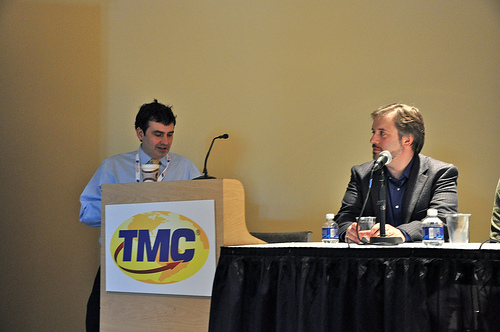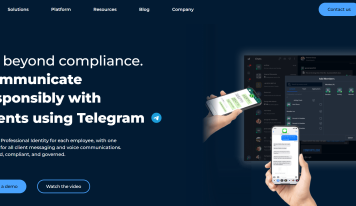Dan York at a recent ITEXPO – specifically the collocated Cloud Communications Summit – Dan is on the right and Thomas Howe is on the left
Yesterday I discussed how open always wins referring to the competition between Apple and Google’s Android and a side conversation was started on Facebook questioning my assertion. I took the opposite viewpoint in a comment and mentioned that Apple does have a lock on customers via iTunes as well as the App Store which have a tremendous lead in the market.
I was reminded of this discussion when I read how Dan York of Voxeo is espousing the virtues of Skype – a closed provider of communications – when Voxeo and Dan are huge proponents of open ecosystems.
As I read the piece, I became fascinated at how Voxeo has chosen to use Skype as a way to make the company’s operations better – utilizing persistent group chats which focus on various subjects.
The point is that using these chats, the company which consists of many people located all over the world and some who travel are able to not only communicate effectively but are able to rapidly be brought up to speed on various topics after getting off an airplane by just logging onto Skype.
Dan mentions that there are other alternatives but it seems from the outside anyway that habit will keep the company using Skype for a long while – even if a better solution comes along immediately.
And this gets us to the counter of the open always wins argument – if you have loyal fans and/or people who habitually uses your interface and are happy with it – or some other differentiator, it becomes tough for competition to come in and take the market over. Even if the new competition is open.
Let’s recall that compared to Apple and iOS, Windows Mobile was very open – it just wasn’t as good as Apple’s OS – and there was no contest from a marketing perspective either.
Apple definitely put together a more pleasing experience and were able to do so in part because they owned the stores, hardware and packaging.
But now, Windows Phone 7 and Google’s Android are taking some of the best parts of the Apple experience and replicating and in some cases improving them.
This in and of itself may not be enough to win against Apple but what the open approach has is a slew of hardware partners making devices in a variety of form factors. Some of these device sizes may catch fire. As an example, I have seen from experience here at TMC that the iPhone is too small for some users with large hands or poor eyesight and the fact that the Droid X has a larger screen makes it a better device than the iPhone in certain situations.
Because Apple employs a closed system with regards to hardware – it has to anticipate every market trend and be better than every hardware maker in the market. Amazingly, they have done this very well and when you look at the company’s products and compare them to the PC space and other mobile players, you can see just how amazingly they design products.
But at some point the choice in the market will likely make Apple’s life very difficult and put them in a position of a follower. When this happens it may mark a turning point from a perception standpoint of customers and the media.
And for a company that makes its living by charging large premiums because they are the innovators – playing catch-up can wreak havoc on the business model.
The stakes are huge – let’s see what sorts of new products and innovations come out next year to further challenge the dominance of Apple and what the customer response will be. Moreover – keep an eye on the patent wars – this is another area which could really shake the markets up and prevent the most-open system from winning.





